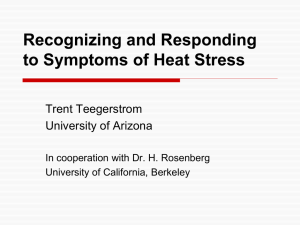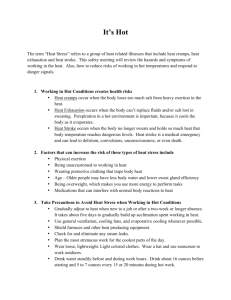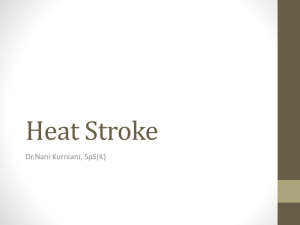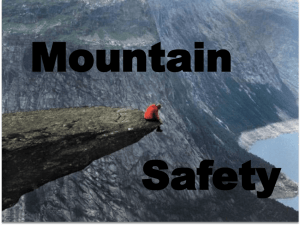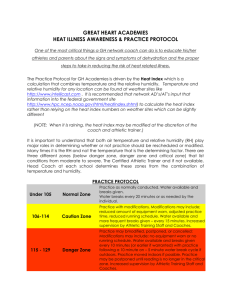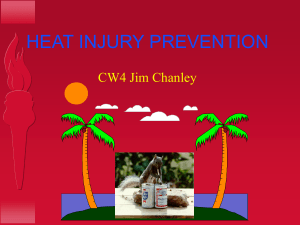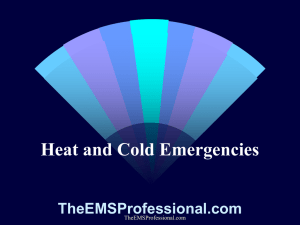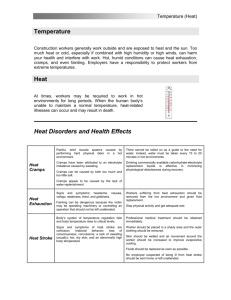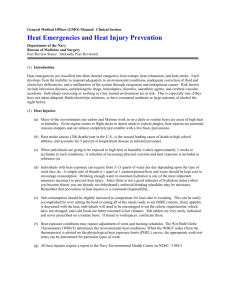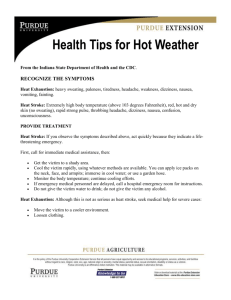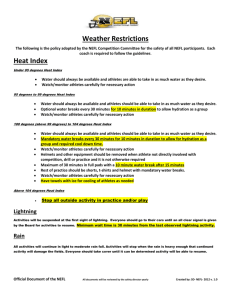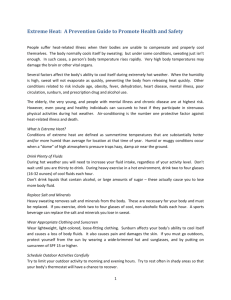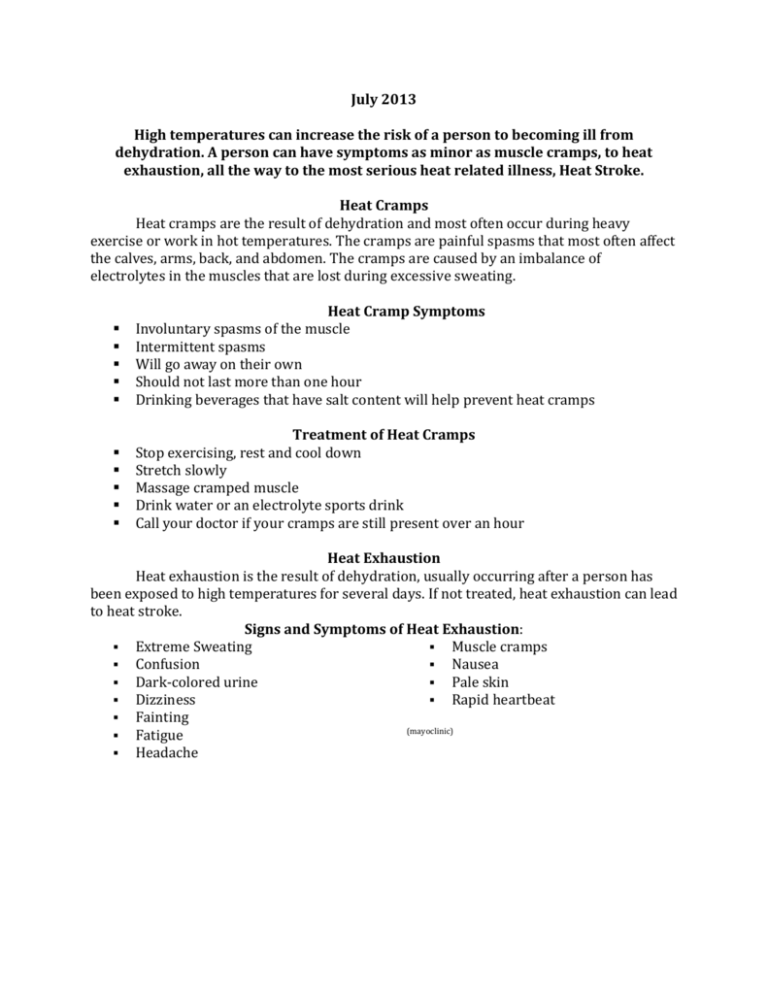
July 2013
High temperatures can increase the risk of a person to becoming ill from
dehydration. A person can have symptoms as minor as muscle cramps, to heat
exhaustion, all the way to the most serious heat related illness, Heat Stroke.
Heat Cramps
Heat cramps are the result of dehydration and most often occur during heavy
exercise or work in hot temperatures. The cramps are painful spasms that most often affect
the calves, arms, back, and abdomen. The cramps are caused by an imbalance of
electrolytes in the muscles that are lost during excessive sweating.
Heat Cramp Symptoms
Involuntary spasms of the muscle
Intermittent spasms
Will go away on their own
Should not last more than one hour
Drinking beverages that have salt content will help prevent heat cramps
Treatment of Heat Cramps
Stop exercising, rest and cool down
Stretch slowly
Massage cramped muscle
Drink water or an electrolyte sports drink
Call your doctor if your cramps are still present over an hour
Heat Exhaustion
Heat exhaustion is the result of dehydration, usually occurring after a person has
been exposed to high temperatures for several days. If not treated, heat exhaustion can lead
to heat stroke.
Signs and Symptoms of Heat Exhaustion:
Extreme Sweating
Muscle cramps
Confusion
Nausea
Dark-colored urine
Pale skin
Dizziness
Rapid heartbeat
Fainting
(mayoclinic)
Fatigue
Headache
Heat Stroke
Heat Stroke is the most dangerous of all heat related illnesses. A person who is
experiencing heat stroke can have a core temperature that reaches over 104 degrees
Fahrenheit. (MayoClinic) The longer a person’s body temperature is elevated the higher their
chances of damaging their organs.
Signs and Symptoms of Heat Stroke
Rapid heartbeat
Not Sweating
Rapid, shallow breathing
Red, hot, dry skin
Confusion
Throbbing headache
Seizures
Dizziness and light-headedness
Unconsciousness
Muscle weakness or cramps
Nausea and vomiting
Treatment of Heat Exhaustion and Heat Stroke
If the person is showing signs of Heat Stroke call Emergency Services immediately!
While waiting for emergency services or if the person is only showing signs of exhaustion…
Get the person into a cool air conditioned space
Apply cool compresses
If the person is conscious and oriented, take a cool shower
If the person does not feel better within one hour seek medical attention.
If you go to the Emergency Room they might…
Blood test to check sodium and potassium levels.
Urine test to check kidney function.
Muscle function tests to see if any muscles were damaged.
X-Rays to assess any internal organ damage.
IV fluids to rehydrate.
Recovery Time
After recovering from heat exhaustion or heat stroke, avoid being in the heat, and do not
engage in heavy exercise for about a week.
Risk Factors for Heat Exhaustion and Heat Stroke
Temperature:
Temperature combined with humidity increases the heat index.
The higher the heat index the higher the chances of a person becoming
dehydrated because their body cannot evaporate sweat efficiently.
Sudden increase in temperature, because a person may not be used to the
heat.
Age:
Children under 4 years old and adults 65 years and older have an increased
chance of heat exhaustion because they adjust to changes in temperature
more slowly.
Health conditions:
Obesity, Diabetes, High Blood Pressure and Heart Disease, Lung Disease,
Kidney Disease, Mental Illness, Alcoholism
Medications:
Sedatives, Stimulants, Diuretics, Heart Medications
Preventing Heat Exhaustion and Heat Stroke
Wear light weight and light colored clothing
Wear hats with a wide brim
Use sunscreen
Drink extra fluids; make sure they do not contain caffeine as that can be
dehydrating.
Drink before, during, and after exercise.
Sources:
http://www.webmd.com/fitness-exercise/heat-exhaustion?page=2
Reviewed by Kimball Johnson, MD on September 30, 2012
© 2012 WebMD, LLC. All rights reserved.
http://www.mayoclinic.com/health/heat-stroke/DS01025 Sept. 2, 2011
© 1998-2013 Mayo Foundation for Medical Education and Research (MFMER
http://www.mayoclinic.com/health/first-aid-heat-cramps/FA00021
April 3, 2012 © 1998-2013 Mayo Foundation for Medical Education and Research (MFMER).

